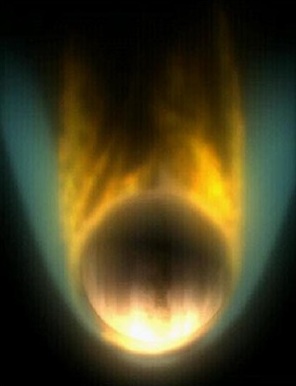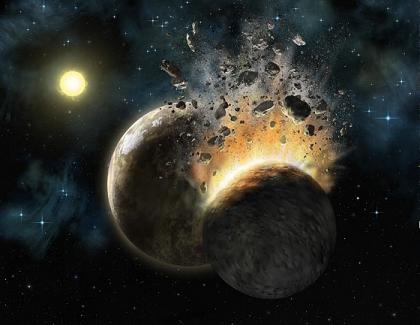The Birth of Venus: Borne of Destruction
Venus in the Folklore of the World Peoples
 " |
According to the Indians of North America the `shooting star' and the `fire drill' set the world aflame. "It was too hot. The sun was put "a handbreadth" higher in the air, but it was still too hot. Seven times the sun was lifted higher arid higher under the sky arch, until it became cooler." In the burning world one could see nothing but waves of flames; rocks were burning, the ground was burning, everything was burning. Great rolls and piles of smoke were rising; fire blew up toward the sky in flames, in great sparks and brands. The great fire was blazing, roaring all over the earth, burning rocks, earth, trees, people, burning everything. Water rushed in, it rushed in like a crowd of rivers, covered the earth, and put out the fire as it rolled on toward the south. Water rose mountain high."
A celestial monster flew with `a whistle in his mouth; as he moved forward he blew it with all his might and made a terrible noise. He came flowing and blowing; he looked like an enormous bat with wings spread and his feathers waved up and down. They grew till they could touch the sky on both sides.
All these elements were not brought together in this Indian narrative by sheer invention.
Ancient Mexican records give the order of the occurrences. The sun was attacked by Quetzal-couatl; after the disappearance of this serpent-shaped heavenly body the sun refused to shine and during four days the world was deprived of its light. A great many people died at that time.
The sky, to show its anger, caused to perish a great number of people who died of famine and pestilence. The Earth had convulsions overwhelmed by a deluge. The cataclysm was accompanied by a prolonged darkness; the days of the Exodus, when a tempest of cinders darkened the world disturbed in its rotation.
The catastrophe of the time occurred when the sun remained in the sky of the [ancient] world for more than a day. The sequence of seasons and the duration of days and nights became disarranged. "It was then that the people regulated anew the reckoning of days, nights, and hours, according to the difference in time."
The clouds that enveloped the Israelites in the desert, the trumpet like sounds that they heard at Mount Sinai, and the gradual lifting of the clouds in the years of the Shadow of Death are the same elements that we find in this Indian legend. After the dramatic events of the time of Exodus, the earth was shrouded in dense clouds for decades, and observation of stars was not possible;
The change that took place
The Blazing Star
The Egyptian priests said that the world conflagration was caused by a shifting of bodies in the sky which move around the earth. The comet Venus - after two contacts with the earth - eventually became a planet. Phaethon, which means `the blazing star,' became the Morning Star.The Four Planet System
The planet Venus was born in the first half of the second millennium [BCE]. In the third millennium only four planets could be seen, and in astronomical charts of this early period the planet Venus cannot be found. In an ancient Hindu table of planets, attributed to the year 3102 [BCE], Venus alone among the visible planets is absent. Indian Brahmins of the early period did not know the five planet system and only in a later period did the Brahmins speak of five planets.Babylonian astronomy, too, had a four planet system. In ancient prayers the planets Saturn, Jupiter, Mars and Mercury are invoked; the planet Venus is missing; and one speaks of `the four planet system of the ancient astronomers of Babylonia.' These four planet systems and the inability of the ancient Hindus and Babylonians to see Venus in the sky, even though it is more conspicuous than the other planets, are puzzling unless Venus was not among the planets.
"The great star that joins the great stars."
The great stars are, of course, the four planets Mercury, Mars, Jupiter and Saturn (when not all the orbs were yet in the heavens) and Venus joined them as the fifth planet.
The great stars are, of course, the four planets Mercury, Mars, Jupiter and Saturn (when not all the orbs were yet in the heavens) and Venus joined them as the fifth planet.
 The Comet Venus During the centuries when Venus was a comet it had a tail. What could give Venus the appearance of a star throwing out smoke? |
| The Vedas said that the star Venus looks like fire with smoke. The star had a tail, dark in the daytime and luminous at night. This luminous tail, which Venus had in earlier centuries, is mentioned in the Talmud as hanging down from the planet Venus. Described by the Chaldeans the planet Venus `was said to have a beard. "Beard" is used in modern astronomy in the description of comets. The Mexicans called a comet `a star that smoked. What was the illusion of the ancient Toltecs and Mayas? What was the phenomenon and what was its cause? A train, large enough to be visible from the Earth and giving the impression of smoke and fir, hung from the planet Venus. Venus, with its glowing train, was a very brilliant body; therefore it’s not strange that the Chaldeans described it as a `bright torch of heaven. Illuminates like the sun,' and compared it with the light of the rising sun. |
| At present, the light of Venus is less than one millionth of the light of the sun. `A stupendous prodigy in the sky,' the Chaldeans called it. The Hebrews described the planet similarly: `The brilliant light of Venus blazes from one end of the cosmos to the other end. A Chinese astronomical text refers to a past when `Venus was visible in full daylight and, while moving across the sky, rivalled the sun in brightness. The Egyptians described Venus (Sekhmet): `A circling star which scatters its fame in fire... a flame of fire in her tempest.' They also called it by the name of Twntemocque, or `the mane.' The Arabs called Ishtar (Venus) by the name Zebbaj or `one with hair,' as did the Babylonians. Venus (Ishtar) `who is clothed with fire and bears aloft a crown of awful splendour.' `Sometimes there are hairs attached to the planets,' wrote Pliny. Hair or coma is a characteristic of comets, and in fact `comet' is derived from the Greek word for `hair.' The Peruvian name 'Chaska' (wavy-haired). is still the name for Venus, though at present the Morning Star is definitely a planet and has no tail attached to it. |
| The coma of Venus changed its form with the position of the planet. When the planet Venus approaches the earth now, it is only partly illuminated, a portion of the disc being in shadow; it has phases like the moon. At this time, being closer to the earth, it is most brilliant. When Venus had a coma, the horns of its crescent must have been extended by the illuminated portions of the coma. It had two long appendages and looked like a bull's head. Rabbinical authorities say that `the devotion of Israel to this worship of the bull is in part explained by the circumstance that, while passing through the Red Sea, they beheld the celestial Throne, and most distinctly of the four creatures about the Throne, they saw the ox. The Egyptians similarly, pictured the planet and worshipped it in the effigy of a bull. The cult of a bull sprang up also in Mycenaean Greece. A golden cow head with a star on its brow was found in Mycenae, on the Greek mainland. The people of far away Samoa, primitive tribes that depend on oral tradition as they have no art of writing, repeat to this day: `The planet Venus became wild and horns grew out of her head.'' The long horns of Venus could have been seen without the aid of a telescopic lens. These horns were illuminated portions of the coma of Venus, which stretched towards the earth. These horns could also have extended towards the sun as Venus approached the solar orb, since horns were repeatedly observed with projections in the direction of the Sun, while the tails of the comets are regularly directed away from the Sun. When Venus approached close to one of the planets its horns grew longer: this is the phenomenon the astrologers of Babylon observed and described when Venus neared Mars. |

Edited from Articles @: http://www.crystallotus.com/TheTransition/025.htm
For more on this topic see The God King Scenario - http://newilluminati.blog-city.com/index.cfm?search=god+king
or in the search box @ http://nexusilluminati.blogspot.com
and see Velikovsky
and read Immanuel Velikovsky’s amazingly erudite ‘Worlds in Collision’.

Xtra Images - http://www.gks.uk.com/images/Comet%20Venus%20diagram.jpg
http://unitedcats.files.wordpress.com/2008/06/planets_collide.jpg
For further enlightenment see –
The Her(m)etic Hermit - http://hermetic.blog.com
New Illuminati – http://nexusilluminati.blogspot.com
New Illuminati on Facebook - http://www.facebook.com/pages/New-Illuminati/320674219559
This material is published under Creative Commons Copyright (unless an individual item is declared otherwise by copyright holder) – reproduction for non-profit use is permitted & encouraged, if you give attribution to the work & author - and please include a (preferably active) link to the original along with this notice. Feel free to make non-commercial hard (printed) or software copies or mirror sites - you never know how long something will stay glued to the web – but remember attribution! If you like what you see, please send a tiny donation or leave a comment – and thanks for reading this far…
From the New Illuminati – http://nexusilluminati.blogspot.com
No comments:
Post a Comment
Add your perspective to the conscious collective